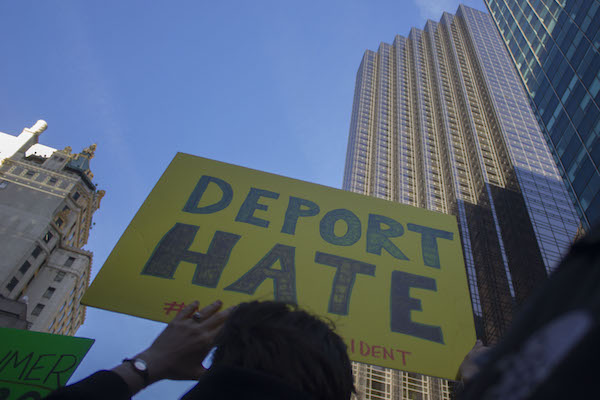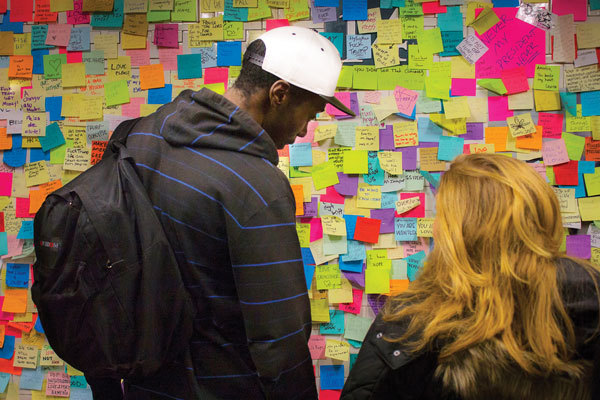
BY ZACH WILLIAMS | Thousands of messages decorated the walls of the Union Square subway station by the time Deanne Beirne added her own yellow pixel on Sun., Nov. 20, to a growing multi-colored display of public outrage toward Donald Trump.
Her message urged “a safer place for all” between notes reading “Be Hopeful” and “We’ve been Trumped.” Beirne had vacillated between such opposing moods since the Nov. 8 election. Standing a few feet away from the collection of messages and sentiments, Beirne noted that she came from Boston for the weekend to find some sort of political solace in the galleries and public art of Chelsea. “Subway Therapy” has been the starting point for many.
“This is people taking emergency action,” Beirne said. “This kind of reaffirms that there are a lot of people who oppose President-elect Trump.”
But the anonymous authors of the messages are not alone in resisting the Republican president-elect. On Nov. 20, elected officials, activists, and residents gathered at the LGBT Community Center (208 W. 13th St., btw. Greenwich & Seventh Aves.), as hundreds of marchers met in Bryant Park, then hit the streets. The West Side of Manhattan has emerged as the epicenter of the growing resistance to Trump two weeks after the election. It all begins by channeling the individual outrage his election aroused into a more long-term and collective approach, activists, residents, and elected officials said.
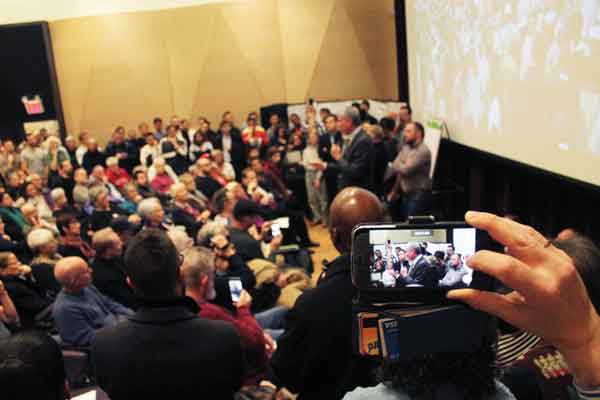
“It is essential that the public speak loudly so that elected leaders — both Democrats and Republicans — as well as the media, do not get lulled into a false sense of business as usual,” Congressmember Jerrold Nadler wrote in an open letter. “This is precisely what the Trump Administration is hoping for and will try to project daily.”
Several hundred people brainstormed how to disrupt that narrative from the LGBT Center, where Nadler spoke on Nov. 20. Local groups plugged their own upcoming events. Gays Against Guns will go after the National Rifle Association — which spent $21 million to support Trump’s candidacy. Local Bernie Sanders supporters are speaking up. One attendee of the meeting passed around the phone number of the rabbi of Jared Kushner, son-in-law of and confidante to President-elect Trump.
Organizers from the office of District 3 City Councilmember Corey Johnson (whose area of coverage includes Chelsea and Hell’s Kitchen) said the purpose of the meeting was to offer locals immediate ways to get involved, whether that is by marching in the streets, supporting Congressional Democrats, or finding common cause with new people. The election of Trump is already becoming a force multiplier for local activists, according to Hell’s Kitchen resident John Bonvelli.
“This is an amazing opportunity to build bridges,” he said.
Organizers intend to curate upcoming events for local groups and facilitate cooperation between residents and elected officials who admit that there is not much they can officially do to stop the Republican majority in Congress. But that does not mean that phone calls to US senators, Speaker of the House Paul Ryan and others cannot highlight the political risks of pushing a Republican legislative agenda that lacks support from the minority, Nadler said.
Mayor Bill de Blasio added that all is not lost, even with Republicans controlling Congress and the White House. Democrats made modest gains in Congress and voters in states across the country approved progressive referenda on issues like the minimum wage and marijuana legalization.
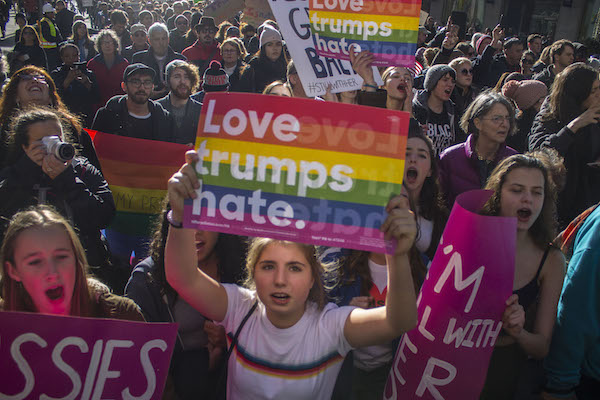
Developments like these do not indicate “a rightward shift in this country,” even if Trump threatens to undermine Obama-era gains on issues such as healthcare, immigration, and gay marriage. It is important to organize without over-thinking, according to de Blasio.
“Progressives sometimes talk themselves out of their own power,” he said.
Some local organizations are entering new political realms while others find fresh opportunities in old causes.
Transportation safety advocacy group Transportation Alternatives urged support for #BlackLivesMatter in a Nov. 14 email about the “intersection of racial justice and traffic justice.” A capacity crowd filled the W. 23rd St. office of Peoples Power Assemblies that night to discuss upcoming actions, including a Dec. 3 protest against white supremacy that will coincide with a KKK march in North Carolina, the two-year anniversary of the non-indictment of the NYPD officer who killed Eric Garner, and International Day for Persons with Disabilities — a demographic Trump disparaged during the presidential campaign.
Trump highlights the dangers of the political, social, and economic conditions that elected him, according to organizer Nathaniel Chase. The energy from recent protests could be redeployed against something bigger than any man, Chase said in an email.
“We want to expand the scope to attach the entire white-supremacist, capitalist, imperialist system in which we live, as the system (not just Trump) is inherently racist, ableist, sexist, anti-LGBTQ and anti-immigrant,” he said in the email.
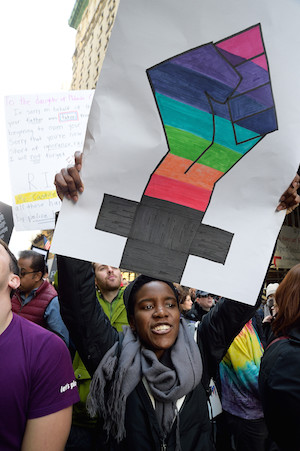
Local activists from the People’s Climate Movement also hope that anti-Trump fervor can drive their activism forward. About 50 people assembled at the W. 43rd St. headquarters of SEIU 1199. The organization that rallied tens of thousands of people against climate change two years ago feels a new urgency, even if it had planned to advocate the next presidential administration — whoever won — to deal with climate change, according to organizer Leslie Cagan.
Democratic politicians like Hillary Clinton hardly inspire loyalty from the more radical side of the American left like herself, Cagan said. But the election of Trump adds new urgency to making the case that climate change relates to the top issues of concern for other people, she added.
“We are not going to win on the climate side if we’re not also engaging in the struggle for economic and racial justice,” she said in a telephone interview.
A representative of the People’s Climate Movement was not seen at the Nov. 20 organizing meeting. But like other local activists, organizers say a Trump presidency offers an opportunity to unite against a common enemy, one that still defies specific description, according to Paul Getsos, a Penn South resident who is the national coordinator for the People’s Climate Movement.
In at least one sense Trump still commands the initiative as he holds the country in suspense, as Getsos awaits an answer to a lingering question of just how tightly the American left should bind together, locally and nationally, in shared opposition to President-elect Trump.
“Are we dealing with a right-wing Republican,” he asked, “or are we actually dealing with a proto-fascist?”
